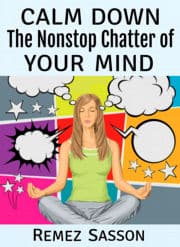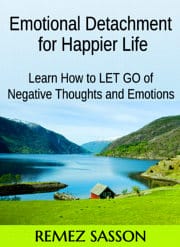
What does freedom mean?
Is it just the freedom to talk, express opinions, and live in a free country, or is it more than this?
Do you think that you are really free? Real freedom does not mean just physical freedom. It also means freedom from restless thinking, emotional attachment, and stress.
Browse our online courses on meditation, positive thinking, overcoming procrastination, confidence, and freedom from distractions.
What does freedom mean, and how do we gain and enjoy it? Being free means a lot of things.
Let’s examine what does freedom mean.
Meaning and Definitions of Freedom
- Freedom means living in a free country.
- It means being free to do what you want and express your opinions without fear.
- It means freedom of choice, freedom of religion, and freedom of speech.
- Being financially independent and able to buy whatever you want.
- The ability to delegate responsibilities to others so you can have more time for yourself.
- The ability to solve problems and get rid of them instead of letting them pressurize and limit you.
- Enjoying a vacation away from work, daily chores, and tasks.
- Quitting a job you don’t like.
- The ability to silence your mind and enjoy inner peace.
Freedom might mean different things to different people, but there are also certain definitions of freedom that apply to everyone. It’s a state of being free.
Inner Freedom
These are just a few examples of the meaning of freedom. However, real freedom is much more than this.
Living in a free country, being able to do what you want without restrictions, or being financially independent are great, but they do not necessarily make you feel free.
This kind of freedom does not free you from mental programming, prejudices, attachments, or wrong beliefs. You might still confine your viewpoint and thinking to a small and limited world.
You might believe you are free but still be ruled by subconscious and instinctive impulses and mental programming, which might lead you into undesirable situations.
There is another kind of freedom, real freedom, independent of external situations and circumstances. This is inner freedom, which lets you experience a sense of peace, happiness, and limitless freedom wherever you are.
External freedom is important, but so is inner freedom, the freedom from endless thinking, worries, and stress. Inner freedom can exist where there is no external freedom, though this is quite rare.
This kind of freedom needs to be developed through certain means and requires time and effort.
A declaration of independence is not enough for experiencing true freedom. True freedom comes from the inside, from an awakened mind, a mind that is free from programming and which can think clearly and without bias.
What Are the Characteristics of Inner Freedom?
Inner freedom has certain characteristics:
1. An open mind and the willingness to accept new ideas.
2. The courage to learn and try to understand different points of view and different opinions.
3. The possession of common sense.
4. The ability to see things from various points of view and not confine yourself to just one point of view.
5. The possession of tolerance and the ability to understand other people without bias, prejudice, or through the colored glasses of one’s beliefs and mental programming.
6. The ability to form your own opinions and not allow other people’s thoughts and opinions to dictate to you how and what to think.
7. The ability to accept new ideas, try new things, and be willing to make changes in your life.
8. Possessing a certain degree of emotional detachment. This ability frees your mind and feelings from adverse external influences and gets rid of attachment to anything that confines and limits you.
Being attached to possessions, thoughts, beliefs, and ideas is like being tied by a rope, which limits your movements.
9. Freedom also means inner peace, the ability to free the mind of unnecessary and useless thoughts, ideas and beliefs. If you can gain this state, you will feel free wherever you are.
10. When you feel free, irrespective of your current circumstances, you let go of all the emotional and mental shackles that tie you down.
How to Feel and Enjoy Freedom
You can feel free and enjoy a sense of inner peace. However, this requires some training and practicing certain simple techniques every day.
You need focus and a certain degree of emotional detachment to enable you to detach yourself from whatever is stressing you and making you restless and unhappy.
Learn About Our Online Meditation Course
Various meditation techniques for finding inner peace, expanding consciousness, and awakening.
Learning to control your mind and thoughts helps you grow a sense of freedom. This requires a certain degree of concentration and mental strength.
Developing a sense of inner peace and learning to calm down the nonstop thinking of the mind also contribute to the sense of freedom.
As mentioned earlier, developing a certain degree of emotional detachment can help you stop taking things personally and free you from stress, inconvenience, and attachments to habits and a mindset that limits you.
Browse our online courses on meditation, positive thinking, overcoming procrastination, motivation, confidence, and freedom from distractions.



